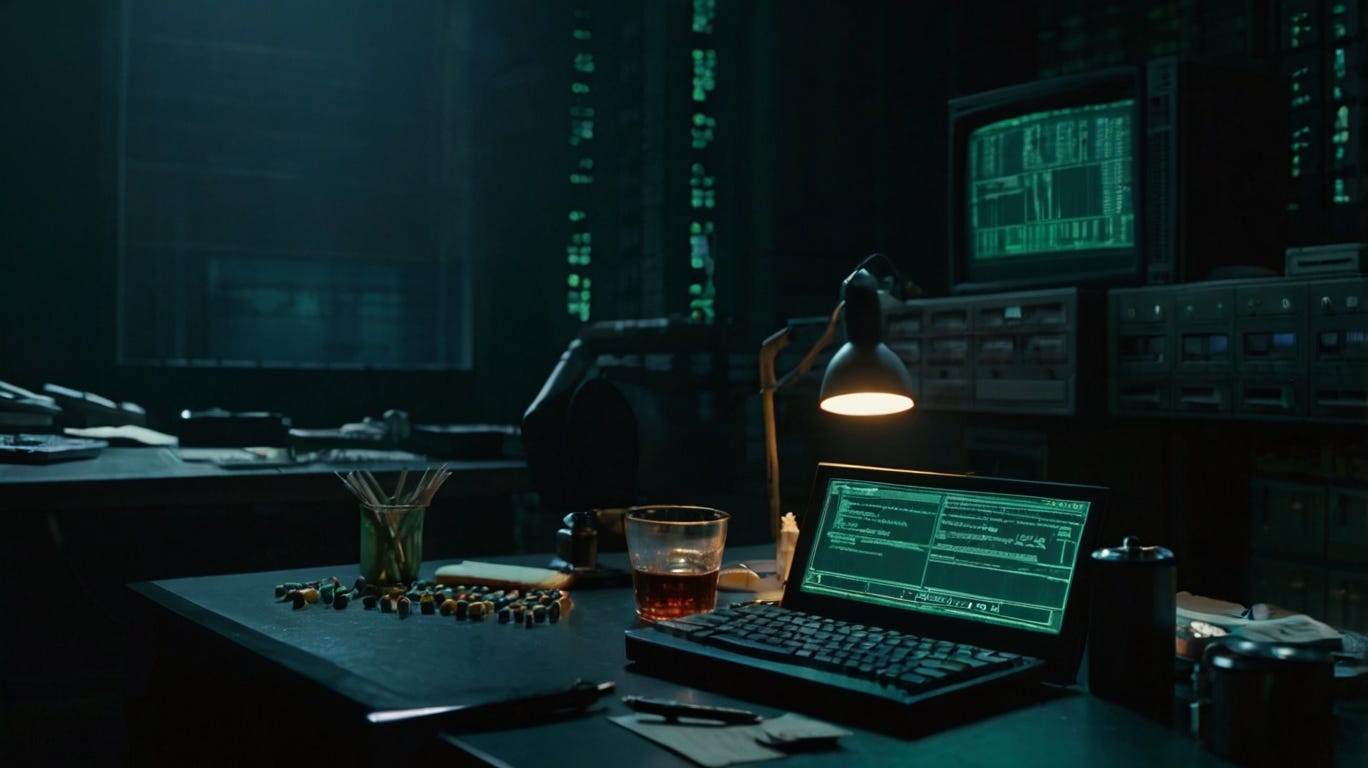Transformation III
The story of thee Silk Road, part three
III In the shadow world
The site's popularity attracts several people who, having operated in the shadow world for years, have much more experience than the inexperienced Ulbricht. Their expertise relates to drug dealing but also the dangers of anonymity. So, inevitably, Silk Road becomes a haven for all those who have already worked in various roles, whether as sellers or website operators. In this sense, ChronicPain’s self-portrayal as a seller, then forum moderator, is quite telling: ›I'm new to this site, but I'm not new to the game.‹ That's not to say street dealers sensed a new business opportunity here. In the early days of the Internet, anonymized communication attracted the attention of anyone who thought they could benefit from a shadowy existence. Websites such as Overgrow.com supplied users with various marijuana seeds – until they were put out of action by the law enforcement authorities. All players who subsequently play a particular role will register within a few weeks – in addition to ChronicPain; these are the later moderators SameSameButDifferent, Nomad_Bloodbath, DigitalAlch, and finally, a man named Variety Jones, who will play a fundamental role for Ulrich. But who is behind all these figures? When, in response to the Gawker article, New York Senator Charles Schumer calls on the DEA and the Department of Justice to shut down the site, it becomes clear agents will also be cavorting on the site. Subsequently, paranoia infects the program; no one can be sure who the other person is, whether they are dealing with one or several people, and whether the person in question does not maintain several accounts or is an agent of the authorities that Senator Schumer has asked to investigate.
It isn't until after Ross Ulbricht leaves the social networks that this game of identities begins, from which Dread Pirate Roberts will emerge. However, it takes Ulbricht a while to find his way in the world, where he will become the mysterious representative of the Silk Road. He especially needs the help of his mentor, who calls himself Variety Jones.
This was the biggest and strongest willed character I had met through the site thus far. He quickly proved to me that he had value by pointing out a major security hole in the site I was unaware of... He has advised me on many technical aspect of what we are doing, helped me speed up the site and squeeze more out of my current servers. He also has helped me better interact with the community around Silk Road, delivering proclamations, handling troublesome characters, running a sale, changing my name, devising rules, and on and on. He also helped me get my head straight regarding legal protection, cover stories, devising a will, finding a successor, and so on. He's been a real mentor.
Variety Jones is also the one who, after inquiring with Ulbricht if he had any confidants IRL (in real life), points out that he needs to come up with a meaningful alias:
(2012-01-15 19:03) vj: Have you seen The Princess Bride? (...) So you know the history of the Dread Pirate Roberts
(2012-01-15 20:59) vj: <-- it's a thought I'm working on, so humour me
(2012-01-15 21:01) myself: can't quite remember
(2012-01-15 21:01) myself: wesley was him though yea
(2012-01-15 21:01) myself: took up his name
(2012-01-15 21:10) vj: and over the years, a new one would take the name,
and the old one would retire.
(2012-01-15 21:11) myself: yep
(2012-01-15 21:11) vj: You need to change your name from Admin, to Dread
Pirate Roberts
(2012-01-15 21:11) vj: <-- isn't kidding - start the legend now
(2012-01-15 21:12) myself: I like the idea
(2012-01-15 21:12) vj: <-- has just put 12 solid hours of thought into it.
(2012-01-15 21:13) vj: clear your old trail - to be honest, as tight as you play
things, you are the weak link from those two prev
contacts
(2012-01-15 21:13) myself: goes along with my captain analogy
(2012-01-15 21:13) vj: and the whole thing - I quite love it.
This dialog briefly illustrates the gulf between real life (IRL) and virtual existence, for the Dread Pirate Roberts is a magical projection screen precisely because, unlike the historical body (which always has confidants), it’s history-less and digital, a social function that can be occupied and abandoned at will. This is a necessity (in the logic of David Chaum's representative) – the protection of privacy is given only as long as the representative (the wallet, the server) is under the sole control of its owner. However, Variety Jones' early assistance shows that even Bitcoin's security architecture has vulnerabilities. As a result, you can never be sure that someone else will not usurp your identity vehicle. To a certain extent, the need to make your identity unreadable creates a kind of structural paranoia. An example of the extent it can take on emerges in Ross Ulbricht's conversation with his confidant Variety Jones, who reappears after a few months of complete absence, this time under the pseudonym cimon.
(2012-10-29 14:35) cimon: yeah - I'm not looking for you - but you've left enough hints - where you went to school - when you started to work and left - info from folks on btctalk who posted images of postmarks from shrooms you sent - yeah – I could narrow it down quick. (2012-10-29 14:35) myself: where i went to school (2012-10-29 14:35) myself: ? (2012-10-29 14:35) myself: I don't remember revealing anything like that: I don't remember revealing anything like that (2012-10-29 14:36) cimon: dude, I'm not trying to worry you - I'm making the point that DA slippped way more shit that you. (2012-10-29 14:37) myself: you are worrying me! won't you ease my mind and tell me what you think you know? (2012-10-29 14:37) cimon: I mean, yer fine, how many experimantal physicists quit to sell shrooms outta ndl anyways, eh. (2012-10-29 14:38) myself: shit, you know about the national dodgeball league! (2012-10-29 14:38) myself: my cover is blown (2012-10-29 14:38) cimon: goddammit! I was making a point, not trying to worry you. Do I think I could find you quickly – absolutley. Would I - what the fuck would I want to do that for - then I have info folks would kill me for. I'd rather not know - the point is it's easy to let info out, and DA did, and I 'll spend $ to follow it up. Shit, if I really wanted to just see you, I'd just ask.
If Ross Ulbricht may have dreamed that his identity was an unassailable fortress, he is proven wrong here. The conversation with his mentor, who reassures him with a series of clues to his own identity, is just the prelude to the much bigger charade that begins at the very moment two Baltimore officers, Shaun Bridges, and Carl Mark Force IV, get involved in the hustle and bustle – a point that segues us into viewing this story from the perspective of law enforcement.


IV The Intrigue
From the law enforcement authorities point of view, the existence of Silk Road is a scandal, as it means that the war on drugs has long been lost – a defeat even more embarrassing as the business is no longer taking place in dark back rooms, but with the help of the US Postal Service. And yet it took nearly three-quarters of a year after Senator Schumer's performance until (as part of a task force formed in Baltimore) Carl Mark Force IV, a DEA agent, registered on the Silk Road forum on March 30, 2012 – under the pseudonym Nob, the biblical site where David captured the sword of Goliath. Carl Mark Force IV (whose real name already seems like a disguise) is a Drug War veteran who, as a young man, proved his worth as an undercover agent.1 With long hair and bronze hoops in his ears, he has had a tribal design permanently tattooed on his back, all in order to connect with Mexican meth smugglers in sinister dive bars such as the Purple Pig Pub in Amalosa, Colorado. Even though his life has changed considerably since then, he still wears Doc Martens boots and a bulletproof vest as a reminder of his undercover adventures. He's settled down with his wife and children in Baltimore's suburbia, attends church, and loves fluffing the pillows in his middle-class home as a relaxation exercise. Even though he now works from behind a computer screen, Agent Force (unlike the New York investigative unit, consisting mainly of computer forensics experts) still feels he is on the front line. So, as soon as he's registered and written his first and only public post, he tries to make contact with the ominous Dread Pirate Roberts. His strategy is simple. He signals (under the pretense of representing a South American drug cartel) that he has much larger volumes of drugs to offer than are being exchanged on the platform. Despite a few warning voices, Ulbricht responds and brings in a confidant who has been in charge of the forum for a good six months: Chronicpain. This user, Silk Road's first employee, is not only responsible for customer support but also earns some extra money trading small amounts of oxymorphone. His customers have given him 100% positive feedback for his 101 transactions. Nevertheless, in his growing paranoia, Ulbricht has had a scan of his driver's license sent to him – and knows he is dealing with a man named Curtis Green. In real life, Green is a disabled paramedic and part-time poker player living in Spanish Fork, Utah, with his wife, two daughters, and their two Chihuahua dogs. His alias isn't incorrect because apart from himself suffering from chronic pain, he has personal bankruptcy and a failed delivery company behind him, but he's mostly suffering from the escapades of his pill-addicted wife, who has been arrested several times for shoplifting and other foolishness. What he has in common with Ulbricht is his libertarian attitude, his enthusiasm for Ron Paul – and, not least of all, the feeling of belonging to a technical elite (which corresponds with his enthusiasm for amateur radio). Through Ulbricht, Curtis Green, aka Chronicpain, becomes the focus of the Baltimore Taskforce. Nob makes it clear that by no means is he willing to send his shipment via the US postal service but wants to do it himself or have it done by his own crew.
On the morning of January 17, 2013, a man wearing a US Postal Service jacket, complemented by a pair of highly inappropriate jeans, places a package in front of Curtis Green's cottage in Spanish Fork, Utah. After seeing the postal worker from his kitchen window, Green takes the package into the house, bearing a return address and a Maryland postmark. Opening it in the kitchen with scissors results in a cloud of white powder hitting the roof of his mouth and numbs his tongue. Shortly afterward, a team of DEA and FBI agents storm the house, throw the surprised landlord to the ground, and handcuff him. Having caught the perpetrator in the act, Agent Force easily intimidates him into revealing his administrator password. Without further ado, Agent Force logs in and immediately changes all access authorizations, and over the next few days, the Baltimore Task Force familiarizes itself with the site's administration. Irritated by his staff member's sudden silence, Ulbricht deactivates his administrative account – but Force, aka Nob, persuades him to reactivate it. Until now, the scenario has all the traits of a well-orchestrated official action, but thereafter, events go off the rails in ways defying explanation.
Agent Force, with an annual salary of $150,000, and his Baltimore colleague Shaun Bridges begin plundering Silk Road users' Bitcoin accounts using their usurped administrative privileges. While Bridges diverts approximately $820,000 worth of bitcoins from Silk Road accounts, Force takes roughly $500,000, all in a single day – until an observant administrator named Inigo notices the outflows and pinpoints Chronicpain's admin account as the source. More than the loss of the money, Ulbricht is shocked by the breach of loyalty – whereby the media reporting Green's arrest for drug possession is cause for more alarm. In this situation, ringleader Nob offers himself as a sympathetic ear and a problem solver. »Ok what do you want done with him, he asks, do you want him beat up. shot, just paid a visit?« Overwhelmed by the situation, Ulbricht consults with the grey eminence, Variety Jones aka Cimon – whereby the latter makes it clear that all the romantic considerations the libertarian disciple displayed in his book club don't fit in with the logic of the current endeavor.
1/27/2013 cimon: BTW, when do we decide we've had enough of someone's shit and turn them off? (...)
roberts: terminate?
roberts: execute?
cimon: Not to mention that whole common law breach of fiduciary duties and duty of care
roberts: if this was the wild west, and it kinda is, you'd get hung just for stealing a horse
cimon: Yeah, pretty much. At what point in time is that the response. We're playing with big money with serious people, and that's the world they live in.
cimon: I sure as fuck don't want nob to try it, fuck up, and then have our laundry aired.
roberts: Unfortunately, there isn't much inbetween
cimon: I know a guy, and he knows a guy who knows a guy, that gets things done.
roberts: in a perfect world, we'd get the money back, plus our expenses and maybe beat him up or something
roberts: but that's not realistic
cimon: Nope. And it ain't the money, fuck, it's your fault, no one elses. Someday I'll tell you a long story from a guy who explained to me why situations like this are always yer own fault.
roberts: so yea, it's a good quesiton I've been thinking about the last 24 hours...
cimon: But he came at us from inside, put many folks at risk, and facing a serious felony he's def the kind of guy that would seel what little he knows for a break with the Feebs
What may once have been an economic simulation now becomes a matter of life and death. Two days after this conversation, when Agent Force, aka Nob, aka Eladio Guzman, inquires what action should be taken regarding the disloyal employee, Dread Pirate Roberts opts for the final solution blown into his ear by his mentor. Nob, backed by the cartel, promises to do the job for $80,000. On February 4, Ulbricht transferred the first installment of $40,000 from an account held by Technocash Limited (which has since been incorporated) in Australia to an account at Capital One Bank in Washington, D.C. Just over a week later, Nob, alias Agent Force, signals him that Curtis is still alive but being tortured. Shortly, photos of the tortured paramedic are sent to Ulbricht, followed by news that he's died of a heart attack. To which Dread Pirate Roberts remarks dryly: »I'm so pissed off that I had to kill him ... but what's done is done.« After being assured on February 28 that the body has been disposed of, the second installment follows.
What Ulbricht doesn't know is the agents have only faked the torture and death of their victim. With the promise of going unpunished, the Baltimore cops have persuaded the terrified Curtis Green to play along with the charade of his torture – whereby the latter, in mortal fear of the supposedly overpowering Dread Pirate Robert, is trying to achieve as realistic an outcome as possible (»This guy has millions. He can take me out at any time«). So the supposed thugs of cartel boss Nobaka Guzman, who are a Secret Service agent in disguise and a postal inspector from Baltimore, set about water-torturing the victim in a Salt Lake City Marriott Hotel bathtub. Force directs the whole thing while filming the action. As soon as the agents pull the victim out of the water, Green is shown the result – and, to achieve a convincing result, the process is repeated four times. As proof of the killing, photos are taken of a pale Curtis Green lying motionless on the floor, smeared with the contents of a Campbell Chicken & Star Soup – a scenographic detail intended to illustrate the consequences of death by asphyxiation.
In fact, the alleged killing of Curtis Green, for which agents Force and Bridges are well paid, is only the beginning of a whole adventurous series of events that are difficult to grasp with the concept of corruption. If you compare the criminal energy displayed by the two agents, it dwarfs everything Ross Ulbricht is accused of in the indictment. Three weeks after settling the matter with the disloyal employee, Carl Mark Force creates a new account on the Silk Road platform under the name DeathFromAbove. Three days later, Ross Ulbricht receives a death threat from him saying he knew Dread Pirate Roberts had something to do with the death of Curtis Green: »You are a dead man. Don’t think you can alude me.« He follows up two days later, claiming to be in possession of TS/SCI (Top Secret and Sensitive Compartmented Information), pointing to his identity, information that the FBI, DEA, and other services would kill for without hesitation. »In fact that's what I do... kill. The only thing that I do...Don't worry DoD has no interest in you and your little website. North Korea and Iran are a lot more important. In fact, as far as the Army and Navy are concerned you are a nobody. Petty drug dealer.« The fact that Agent Force, previously shrouded in the dark aura of a South American cartel member, now presents himself as a Green Beret and elite soldier falls into Hollywood logic, which generally characterizes his actions. In any case, he sends Ulbricht the information of a student who has temporarily (and mistakenly) become the focus of the investigation, with a request for $250,000 in cash or wire transfer. Take it as compensation [for the death of Curtis Green]—Death from Above.
The chutzpah displayed here is astonishing, as Carl Mark Force IV isn't afraid of monetizing his knowledge of a self-orchestrated crime. He also benefits from the fact the activities of the two task forces in Baltimore and New York have been merged and coordinated since February. Thus, he can benefit from the progress made by his colleagues in New York and use it to his advantage. On August 26, 2013, he makes another blackmail attempt, this time under the pseudonym French Maid – who pretends to know an imaginary member of the investigating authority, named Kevin, while promising information about an ongoing investigation into Silk Road so convincingly that Ulbricht agrees and transfers around 98,000 dollars for the documents. Now Force does not limit himself to just these kinds of maneuvers but designs a future where he's no longer the diligent investigator participating in the legendary rise of Bitcoin itself, obviously following Dread Pirate Roberts’ example. Indeed, Bitcoin's price performance in 2013 was unprecedented. While one Bitcoin was still trading at $13.36 on January 5, 2013, it reached its all-time high of $1124.76 on November 29, an increase of a gigantic 8,418% – despite the Mount Gox scandal in the middle of the year, which revealed that Bitcoin was not immune to fraud. Carl Mark Force invests $110,000 of his loot in a company called CoinMKT, making him one of its biggest investors. He also offers the company the opportunity to use government databases to check customers for money laundering activities. Being promoted to the company's Compliance Officer, he soon finds an opportunity to freeze a client's account and transfer the equivalent of about $300,000 worth of Bitcoins to his own account at Bitstamp. This means Force's involvement in all of this is now complex: in addition to blackmail and the sale of investigative information, he even uses forged penalty orders to achieve his goal. What leads to his unmasking is his act of splitting himself up, which is carried out to perfection. To convert his Bitstamp balance into actual dollars, he logs on to the TOR server – triggering alarm bells and a KYC (Know Your Customer) procedure at the company, which is on its guard against accusations of money laundering. Force then explained that he was an agent of the DEA, citing his colleague Shaun Bridges as his guarantor. Although Bitstamp paid him the requested $200,000, however, they also informed his department or another higher authority. This, in turn, led to Force's activities being investigated, culminating in a criminal warrant against Force and Bridges. When Carl Mark Force IV is finally arrested, he's carrying his passport, $5,000 in cash, and an unregistered revolver. They also found that his colleagues had planned an exit route from the Dominican Republic to Panama, Morocco, and finally, Algeria.
V Limbo
Now, the corrupt government officials' activities aren't Ulbricht's only problems. From the day he decided to execute his employee Curtis Green, prompted by his grey eminence, Variety Jones aka Cimon, one horror story follows the next. On March 13th, 2013: an extortion attempt by a seller who claims to have hacked into another seller's account and thus acquired customer data – and if Dread Pirate Roberts doesn't pay him the sum of 500,000 dollars, he'll make his knowledge public. It's reported on Reddit that the Silk Road IP address has been leaked – a message immediately sparking fierce debates and a thorough unsettling of users. On March 29, the blackmailer contacted him again, this time with a 72-hour ultimatum. This event follows the blackmail pattern that Carl Mark Force staged successfully. Of course, it's still unclear if it's government officials or Silk Road salesmen who, in the dual persona of perpetrator and victim, have Ulbricht in their grip. The only sure thing is what was formerly a center of trust has become a hotbed of mistrust. Once again, Ross pays a large sum to have the blackmailer eliminated – and once again, shortly before the request expires on April 1, 2013, he receives a message that the problem has been taken care of: Stay calm, he won't blackmail you again. Never again. A little later, a photo of the murdered man arrives, together with the random number that Ulbricht had previously sent. His reply: I have received the photo and deleted it again. Thank you for your swift action. And as if this was just the prelude to another reprise, the killer (posing as a member of the Hell's Angels) informs him the murdered man had been working with another seller on the site, Tony76, who'd distinguished himself on the Silk Road platform by running a large-scale scam on his customers. He claims Tony76 was a dealer from British Columbia, where he lived and worked with four other people to sell his products. Once again, Ulbricht resorts to the tried and tested method of instructing his confidant to eliminate all four ringleaders. Ulbricht pays the equivalent of $500,000 – almost the exact amount the original blackmail would have generated. Meanwhile, problems are also mounting on the technical side. For the first time, Silk Road has to deal with intensive hacker attacks, leading to server overload and ultimately to the site coming to a standstill. The background: two competitors, Atlantis and Agora, have aggressively entered the market more publicly than Silk Road ever had before. Rumors are circulating that the DoS (Denial of Services) attacks are due to the competitors wanting to get a slice of the pie. Ulbricht and his programmers spend a good month further minimizing the vulnerabilities – but ultimately, he pays the attacker $50,000 to be spared such future attacks. All this madness becomes apparent in the little notes Ross Ulbricht keeps of his activities, as can be read in the following entry dated 4.4.2013:
withdrawals all caught up made a sign error when fixing the bond refund bug, so several vendors had very negative accounts. switched to direct connect for bitcoin instead of over ssh portforward received visual confirmation of blackmailers execution
And a little later:
04/08/2013 sent payment to angels for hit on tony76 and his 3 associates began setting up hecho as standby very high load (300/16), took site offline and refactored main and category pages to be more efficient 04/09/2013 problem with load was that APC was set to only cache up to 32M of data. Changed to 5G and load is down to around 5/16. ssbd considering joining my staff... 04/10/2013 some vendors using the hedge in a falling market to profit off of me by buying from themselves. turned of access log pruning so I can investigate later. market crashed today. being blackmailed again. someone says they have my ID, but hasn't proven it.
Just as the order to murder Curtis Green crossed a moral line, these recent month's entries make it clear that Silk Road is no longer a libertarian crowd-pleaser's and would-be entrepreneur's project: it's become a million-dollar enterprise that brings with it the corresponding covetousness, turf wars and adversities: a cold war whose sole purpose is to increase personal wealth. However, unlike start-ups, which are usually joint ventures, there's no cohesive community here, just a loose network of employees who, hidden behind cloaks of invisibility, can never really get close to each other. Batman3is a cocaine-addicted Australian called Peter Nash, Inigo is a guy who lives on a boat, smokes a lot of marijuana and has a sobriety to match this lifestyle, and only the programmers like H7 or Smed display any reliability, perhaps due to their profession. And presiding over everything is the Dread Pirate Roberts, whose autocracy is accompanied by increasing isolation. After all, the slogan he issued when he became Dread Pirate Roberts still applies: »I am Silk Road, the market, the person, the company, everything.« If the founder's secrecy and unshakeable belief in the market's liberating effects won buyers' trust, the Machine he's created now turns against him. Yet the dilemma – totally independent of his successfully implemented confidence-building measures – is of a structural nature and has to do with the moment when the representatives' logic has to be translated into real life. Because the moment a buyer wants to have their goods sent to them, they must disclose their identity as their name and address. The Silk Road Code of Conduct may stipulate that the seller doesn't collect customer data, but the Dread Pirate Robert cannot monitor this part of the trade.2 If a trader accumulates enough customer data, he then has enough material in his hands to blackmail the operator of the site – not to mention the artfully orchestrated conspiracies to which Ulbricht has been exposed since the beginning of 2013. Here lies the fundamental flaw in the Economic Simulation that Ross Ulbricht presented in his LinkedIn post: his naïve notion that a network like Silk Road will put an end to violence, coercion, and all other forms of one person exercising power over another. The lesson of 2013 is, however, a different one. It teaches him that the economic simulation of the Silk Road works for only as long as customers trust the ship's captain. Thus, every blackmail attempt is an attack on the entire community – after all, every security leak that becomes public undermines the entire company's functionality. And, while a company operating within the law can call on Police and Judicial authorities – and with them: the Force of the State for help – the Pirate Ship's Captain can only defend himself against attacks with naked violence. As if in a burning of a magnifying lens, the Leviathan problem of envisaging not only bureaucratization and institutionalization is repeated here but, above all, the monopolization of violence. But this is precisely what brings Ulbricht into irresolvable conflict with his own ideals. While in the platform's early days, when the sheer novelty of the undertaking dazzled his followers, he was able to act as a benevolent sovereign, he increasingly finds himself forced to act like a pirate king or the ruler of a mafia clan.
»Worth« is a curious term here, specifically how his worth is creating a Law Enforcement’s dream of writing an entrapment script of taking theSilk Road to the level of an organized crime syndicate to remove what the U.S. Legal System had no way of coping with, namely the creation and orchestration of something straight out of the Libertarian thought that written into the U.S. Constitution. What’s so strange is the double movement here: The removal of what the Legal System can’t cope with while exploiting the process for personal profit – perhaps this is the reason behind some of the redactions within the excerpts from Ross Ulbricht’s diaries entered as evidence in his trial.
In fact, the interrogation of a New York drug dealer who shipped a good 1.5 kg of cocaine via Silk Road showed that he did not comply with this regulation at all.









